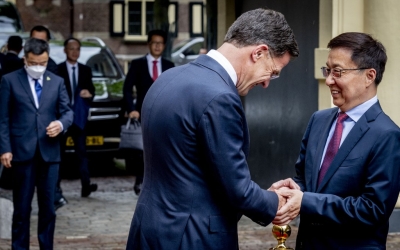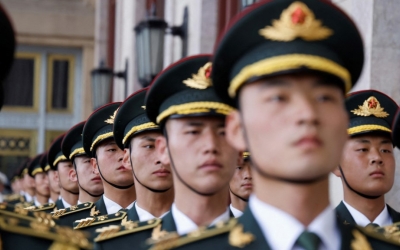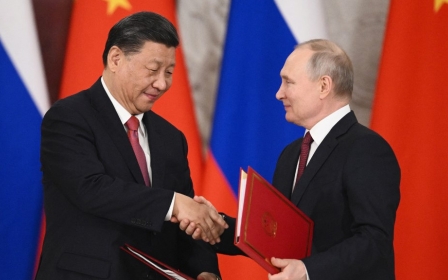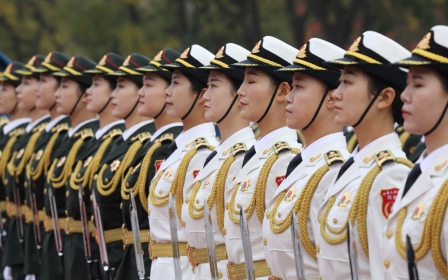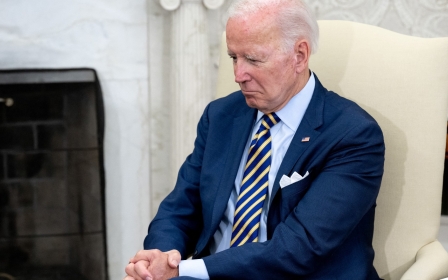US declares death of neoliberalism and demands new global consensus

President Joe Biden's national security adviser, Jake Sullivan, recently addressed the Brookings Institution with a topic entitled nothing less than "Renewing American economic leadership". It was also a sort of new blueprint for the G7, which ended its work in Hiroshima last Sunday.
It was a laudable effort to look truth in the eye. One authoritative pundit compared it to a "new Washington consensus".
The reference is to a term coined in 1989 by British economist John Williamson to define a de-facto post-Bretton Woods global economic model that the US has been systematically preaching, and somewhat imposing, since then.
It envisages free-market promotion policies like trade and finance liberalisation, and extended privatisation. Fiscal and monetary prescriptions aimed at minimising deficits and inflation have also been part of the package. It later turned into a neoliberalism manifesto, the real blueprint of the so-called Tina (there is no alternative) ideology.
The speech claimed that: "The United States led a fragmented world to build a new international economic order. It lifted hundreds of millions of people out of poverty... sustained thrilling technological revolutions. And it helped... the world achieve new levels of prosperity.
"But the last few decades revealed cracks in those foundations. A shifting global economy left many working Americans and their communities behind. A financial crisis shook the middle class. A pandemic exposed the fragility of our supply chains. A changing climate threatened lives and livelihoods. Russia's invasion of Ukraine underscored the risks of over-dependence.
"So this moment demands that we forge a new consensus."
Four fundamental challenges
The statement also identified four fundamental challenges: 1) the hollowing out of America's industrial base; 2) a new environment defined by geopolitical and security competition; 3) an accelerating climate crisis and the urgent need for a just and efficient energy transition; and 4) inequality and its damage to democracy.
The list of what went wrong was long: the fading of public investment replaced by tax-cutting, deregulation, privatisation and trade liberalisation, all seen as ends and not means; excessive confidence in the market's capability to allocate capital productively and efficiently which pushed the "entire [US] supply chains of strategic goods... to move overseas"; deep trade liberalisations that did not honour the promise of allowing American exports and safeguarding its jobs and know-how.
China was accused of having exploited globalisation by cheating on trade terms, with the US paying the price. Excessive attention was given to finance, and to the financialisation of the economy, to the detriment of the real economy, mainly semiconductors and infrastructures.
On geopolitical and security competition, Sullivan remarked that "the premise that economic integration would make nations more responsible and open, and that the global order would be more peaceful and cooperative... didn't turn out that way".
China and Russia are the main villains here. The first for having integrated itself into the international economic order by maintaining a non-market system that subsidises both traditional industrial sectors and new ones, such as clean energy and digital infrastructure.
The second, of course, for having invaded Ukraine, creating a catalyst for a Global Rest and South revolt against the Global West.
Such a double challenge would have been made even more serious by the dependencies created by decades of liberalisations determining energy uncertainty, and supply-chain vulnerabilities in critical sectors such as semiconductors and key minerals that could be exploited for economic or geopolitical leverage.
Put simply, the US is now rejecting neoliberalism and its enabling tool, globalisation, and proposing a new approach, beginning with trade and supply chains.
'Everything we've done was wrong'
As for inequalities, Sullivan bravely blamed "decades of trickle-down economic policies... regressive tax cuts, deep cuts to public investment, unchecked corporate concentration and active measures to undermine the labour movement" that "frayed the socioeconomic foundations on which any strong and resilient democracy rests".
His statement was so eye-catching that summarising it in one sentence would sound as shocking as saying: "Everything we've done and said over the last few decades is now wrong."
The recipe offered to fix what went wrong was "a modern American industrial strategy [which]... identifies specific sectors that are foundational to economic growth, strategic from a national security perspective".
Chips top the list. "America now manufactures around 10 per cent of the world's semiconductors... [and] this creates a critical economic risk and a national security vulnerability," Sullivan said.
Critical minerals were "the backbone of a clean-energy future", "more than 80 percent of critical minerals are processed by one country, China", and "clean-energy supply chains are at risk of being weaponised [by China] in the same way as oil in the 1970s, or natural gas [by Russia] in Europe in 2022". An unacceptable condition for Washington.
Chips, critical minerals and some advanced technologies should be safeguarded in a "small yard with a high fence" to maintain the US's technological edge over China and curb the latter's rise militarily, and not - Sullivan emphasised - to constrain China's growth.
America's partners were deemed essential to success: Europe, Canada, Japan, South Korea and Taiwan. Hopefully India too. Sullivan's message was unequivocal: "We will unapologetically pursue our industrial strategy at home - but we are unambiguously committed to not leaving our friends behind. We want them to join us. In fact, we need them to join us."
Overambitious and out of touch
By Washington Beltway standards, the speech was remarkable. Less so if it aimed to win hearts and minds in the Global South and Rest towards new US global rules for a better world order. From this viewpoint, it appeared overambitious and out of touch with both US allies' concerns and the ongoing global tectonic power shift.
Overambitious because America is on a declining trajectory. It is extremely divided, and that trend is increasing, to the extent that it might come close to a civil war at the next presidential election. In a nutshell, it can barely inspire inside its borders, not to mention outside.
British philosopher John Gray recently remarked that: "The idea that a nation now so intractably divided could construct a new international order is far-fetched."
Nothing better than the periodical US internal political saga about the debt ceiling - which, incidentally, could precipitate another global financial crisis - exemplifies such a concept. Actually, the debt ceiling is just the tip of the iceberg.
The hollowing out of America's industrial base was not due to excessive confidence in the market's balancing power, or because of China's unfair trade practices, but because of US corporate sector greed
Out of touch because America struggles to inspire trust. Looking truth in the eye is the first step. Building trust in US economic leadership renewal implies more resoluteness and fewer compromises with a recent, embarrassing past.
The hollowing out of America’s industrial base was not due to excessive confidence in the market's balancing power, or because of China's unfair trade practices, but because of US corporate sector greed, which was encouraged and facilitated by all US administrations since Ronald Reagan's.
US businesses outsourced entire industrial chains to Asia to exploit much lower labour costs and make more profits. It threw millions of American workers under the bus. This resulted in the Tea Party and Donald Trump at the White House.
Disgracefully, those huge profits were neither invested in improving US business competitiveness nor in keeping its technological lead. At the same time, the last three US administrations spent $7tn on endless and useless wars in western Asia instead of fixing the country's decaying infrastructures.
Looking truth in the eye
The Trump administration’s $1tn corporate tax breaks in 2017 were wasted in shares buybacks and outrageous bonuses for top management. China might have unscrupulously used globalisation, but at least it did so for the good of most of its population: 800 million people were lifted from extreme poverty in just three decades. US profits only went to the 1 percent; or even just the 0.1 percent.
As for supply-chain weaponisation, in the early 1970s oil producers weaponised their product not out of the blue, but to protest against specific US policies in the Middle East.
As for gas in 2022, it was Europe that decided not to rely any more on Russian supplies and not the other way around; and any residual doubt on the soundness and sustainability of such a policy was erased by the blowing up of the Nord Stream pipelines.
Finally, looking truth in the eye implies admitting that the country that systematically weaponised economics and finance was the US, through its unilateral global sanctions, which, according to a just-published study, hit 29 percent of the world's economy.
The American establishment and mainstream media might have removed such inconvenient truths, the Global Rest and Global South did not. As such, the US narrative on a new Washington consensus as a tool to win the alleged ongoing battle between democracy and autocracy sounds unconvincing.
The Global Rest and Global South see it as a hypocritical "oligarchy v autocracy" competition. Not very inspiring. Their likely conclusion is: "The rules of the game were good when they allowed the US and Global West to win and dominate, but now that such hegemony is becoming uncertain, the rules must change."
Not enough consensus
It should not come as a surprise, then, if a lot of countries might prefer to sit on the fence and remain non-committal towards western sanctions and narratives versus Russia and China. To quote a former US official: "They want to decide, not be told, what's in their interests."
There might be then not enough consensus on the new Washington consensus, both inside and outside America.
Europeans remain wary of massive US subsidies for the energy transition. Chip restrictions against China, contrary to Sullivan's claims, are everything but tailored; judging the Chips Act from the resources Washington has mobilised and the massive investment the sector requires gives the impression that the US has brought a knife to a gunfight.
The Washington Beltway's cognitive empathy deficit towards the Global Rest and Global South remains an unsurmountable blind spot - and a primary source of distrust
Regardless of Sullivan's laudable effort, Washington's main problem remains the persistent gap between the words it utters and the actions it performs. Even if the US administration should succeed in devising new global rules, there is a looming perception that - as has been the case in the last three decades - they would be applied biasedly and for primarily US or western interests.
The Washington Beltway's cognitive empathy deficit towards the Global Rest and Global South remains an unsurmountable blind spot, and a primary source of distrust. The slow but steady erosion of the US dollar as the global reserve currency is another disquieting alarm bell.
The latest warning came from Fiona Hill, a former top official on Russian affairs in Washington, who has gone so far as to define the war in Ukraine as "a proxy for a rebellion by Russia and [the Global] Rest against the United States".
The US national security adviser's speech is encouraging, but still not enough; at least not until the US is able to look all the truth in the eye.
The views expressed in this article belong to the author and do not necessarily reflect the editorial policy of Middle East Eye.
Middle East Eye propose une couverture et une analyse indépendantes et incomparables du Moyen-Orient, de l’Afrique du Nord et d’autres régions du monde. Pour en savoir plus sur la reprise de ce contenu et les frais qui s’appliquent, veuillez remplir ce formulaire [en anglais]. Pour en savoir plus sur MEE, cliquez ici [en anglais].



